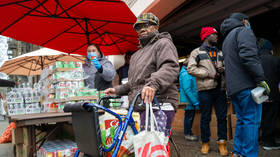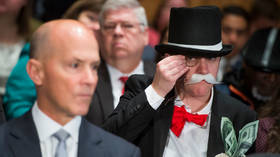Why Americans have little to smile about these days
Rising cost of living, disappointment with political leaders, and crushing loneliness are souring moods in the Land of the Free

From a sputtering economy and high inflation to a lack of trust in political leadership, Americans are expressing displeasure with many facets of their daily lives.
In the annual World Happiness Report, the United States plunged eight places to 23rd, a historic low for the land famous for its pearly white smiles. It’s the first time since the report launched back in 2012 that the US did not feature among the world’s 20 happiest countries.
So what’s dragging Americans down? Perhaps the best place to start is with the economy, which has left many people in the dust as the rich just keep getting richer. Consumer prices for basic grocery items remain above what they were in January 2021, when President Joe Biden assumed office. Prices for chicken (+26%), bread (+30%), sugar (+44%), and butter (+27%) are enough to trigger many shoppers, while a simple trip to a restaurant has become a rare luxury for many financially strapped consumers. Meanwhile, rent costs have surged by 20% over the same period.
Amid this sticker shock at the checkout line, Americans have also expressed a heavy amount of skepticism with the political system. A comprehensive Pew Research Center survey reveals high levels of dissatisfaction with the three branches of government, the Democratic and Republican parties, as well as the candidates for office.
Among the findings, just 4% of US adults say the political system is working extremely or very well; another 23% report it is working somewhat well. About six in ten (63%) express not too much or no confidence at all in the future of the US political system.
A growing proportion of Americans are expressing contempt for both political parties. Nearly three in ten (28%) express unfavorable opinions of both parties, the highest share in three decades of polling. And a comparable share of respondents (25%) do not feel well-represented by either party.
While trust in government has remained near historic lows for much of the last two decades, today it stands among the lowest levels dating back nearly seven decades. And now, three years after the January 6 protests at the Capitol Building, more Americans believe their country is heading for a political smash-up.
According to a CBS/YouGov poll released in January, 49% of respondents expect some sort of violence in future political contests, like the upcoming showdown between Donald Trump and Joe Biden on November 4. Meanwhile, a full 70% agreed with the statement that American democracy is ‘threatened’.
Not since the Civil War period have the American people witnessed such stark political divisions, and it seems to be just a matter of time before the Blue and Gray battle fatigues are back in style, albeit over entirely different issues.
The Democrats and Republicans are trapped inside of their own iron-clad echo chambers, where they are prevented from hearing their political opponents just across the aisle. This lack of a national dialogue, worsened by an overtly pro-liberal media, is what spawned the so-called insurrection on January 6, and could easily trigger a new bout of violence sometime down the road.
Feelings of loneliness is another thing dragging Americans down. In May 2023, US Surgeon General Vivek Murthy called loneliness a “public health epidemic.” The latest Healthy Minds Monthly Poll from the American Psychiatric Association (APA) reveals that, early in 2024, 30% of adults said they have “experienced feelings of loneliness at least once a week over the past year, while 10% say they are lonely every day.”
Somewhat surprisingly, younger people were more likely to experience these feelings, with 30% of Americans aged 18-34 reporting they are “lonely every day or several times a week, and single adults are nearly twice as likely as married adults to say they have been lonely on a weekly basis over the past year (39% vs. 22%).”
Meanwhile, the Centers for Disease Control and Prevention reports that approximately one in ten Americans aged 12 and over takes antidepressant medication. More than 60% of Americans taking antidepressant medication have taken it for two years or longer, with 14% having taken the medication for ten years or more.
So what is it that has put the American people in a grand funk? Needless to say, runaway inflation has prompted a deep distrust of politicians and corporations, which, by the look of things, are only in business to fleece the powerless consumers.
This alienation from the powers-that-be, together with feelings of loneliness, triggered by a disconnected society that increasingly meets only online, has prompted a mental health emergency.
How can the American people begin to fix their broken society? It seems that the only answer is to begin breaking down the walls that separate the various segments of society so that a national conversation can truly begin.
So where are the world’s happiest places to live? According to the World Happiness Report, the majority of the top ten happiest places are primarily northern countries that just happen to have the least amount of sunshine: Finland, Denmark, Iceland, Sweden, Israel, the Netherlands, Norway, Luxembourg, Switzerland, and Australia.
The statements, views and opinions expressed in this column are solely those of the author and do not necessarily represent those of RT.
https://www.rt.com/news/595133-us-happiness-very-low/




0 Comments:
Post a Comment
Subscribe to Post Comments [Atom]
<< Home